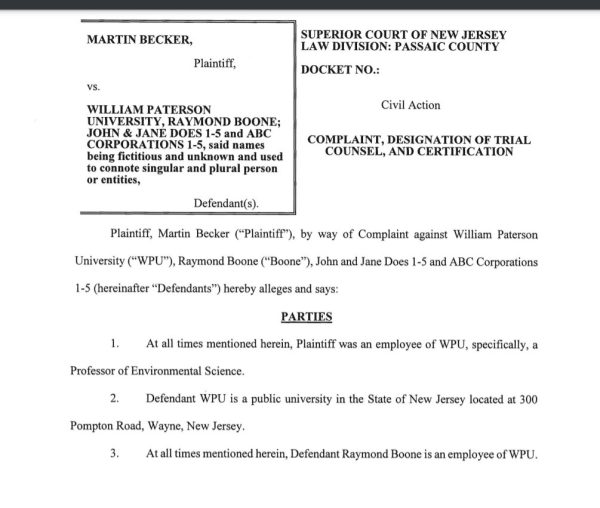
The audacious story rippled across campus this spring: a professor was suing William Paterson University for losing his collection of millions-years-old fossils, drawing headlines in The New York Post, NBC News, and The Philadelphia Inquirer.
Students and faculty have had two months to absorb the unusual situation since the news broke in March. Now, the Beacon has landed an exclusive interview with someone with a particularly relevant perspective: Ken Levy, a professor currently suing his own university, Louisiana State.
Still unfolding hundreds of miles from Wayne, Levy’s story highlights the tension and uncertainty that can arise on a college campus when a professor sues their university–and the awkward position that William Paterson students and faculty are now encountering.
The William Paterson professor, Martin Becker, sued in March for negligence. He alleges the university failed to pay UPS bills, resulting in fossils that he was mailing to a research collaborator, after collecting them for hands-on learning and student recruitment, being dumped in a Tennessee landfill.
Levy, meanwhile, sued LSU in January after he was put on paid leave for expressing opinions about President Trump and the governor of Louisiana during a lecture. His case has reached the Louisiana Supreme Court.
Becker has not responded to the Beacon since May 9 seeking comment on how this lawsuit may affect his future students moving forward.
Levy said his lawsuit against LSU had actually strengthened his relationship with students, many of whom sent him emails of encouragement. “It was overwhelmingly moving and helpful to receive so much support from current students and former students,” he said. “To get all that support really helped me cope.”
Becker isn’t listed on the university’s course offerings page as teaching any courses this spring, summer, or fall. But, similar to Levy’s experience with his students, William Paterson students said they support Becker’s decision to sue the university. Jarisse Hidalgo, a graduating senior studying criminal justice and psychology, said she admires Becker’s integrity.
“I would be proud of anyone for sticking up for themselves and their work, especially when it involves academic resources that benefit not only the individual but also students, researchers, and the wider scientific community,” Hidalgo said.
Freshman Naveah Munoz, a legal studies major, said that she didn’t have a negative view of professors who sue their universities.
“In fact, I might respect them even more for having the guts to hold their institution accountable,” Munoz said. “Universities are powerful, and sometimes issues get swept under the rug to protect reputations. If a professor is willing to risk their career, professional relationships, and public image to bring attention to a serious problem, that says a lot about their values and priorities.”
Junior Ethan Acosta, a graduating biology major and assistant teacher for the College of Science and Health, said he would view his professor a little differently if they had sued their university. Acosta said he would be “hesitant” speaking about some topics with the professor.
“There would be a slight change in our relationship,” Acosta said.
Acosta said he thought Becker’s lawsuit against the university was justified since he had years’ worth of work thrown into a landfill.
“I could understand why he’s doing it, and I would probably do the same thing,” Acosta said. “That’s my life’s work, all of a sudden, it’s in the garbage. Kind of a little disrespectful, a little negligent on the school’s part.”
Five William Paterson students with majors in environmental science have not responded to the Beacon for interviews.
Risa Lieberwitz, a labor and employment professor at Cornell University who serves as president of the university’s chapter of the American Association of University Professors, said that the lawsuit may impact Becker’s teaching style.
“Anything that impacts your research may affect your teachings,” Lieberwitz said. “And in this particular lawsuit, the impact is severe and is more than a minor annoyance.”
Levy said that suing a university creates unavoidable stress. “There’s no waving it away,” he said. “There are some days that are better than other days where the trauma is less, but sometimes the stress and anxiety are overwhelming.
Levy said he reduced stress by spending time with his four dogs and a cat, hanging out with his friends, listening to audiobooks, and working as a contract attorney.
“You’ve got to keep yourself busy, and it’s very hard in the first few weeks because all you’re thinking about is the trauma,” Levy said. “But, after things die down a little, you can start to focus on other things.”
John A. Byrne • May 26, 2025 at 6:57 pm
I grays on a fair and well told story.